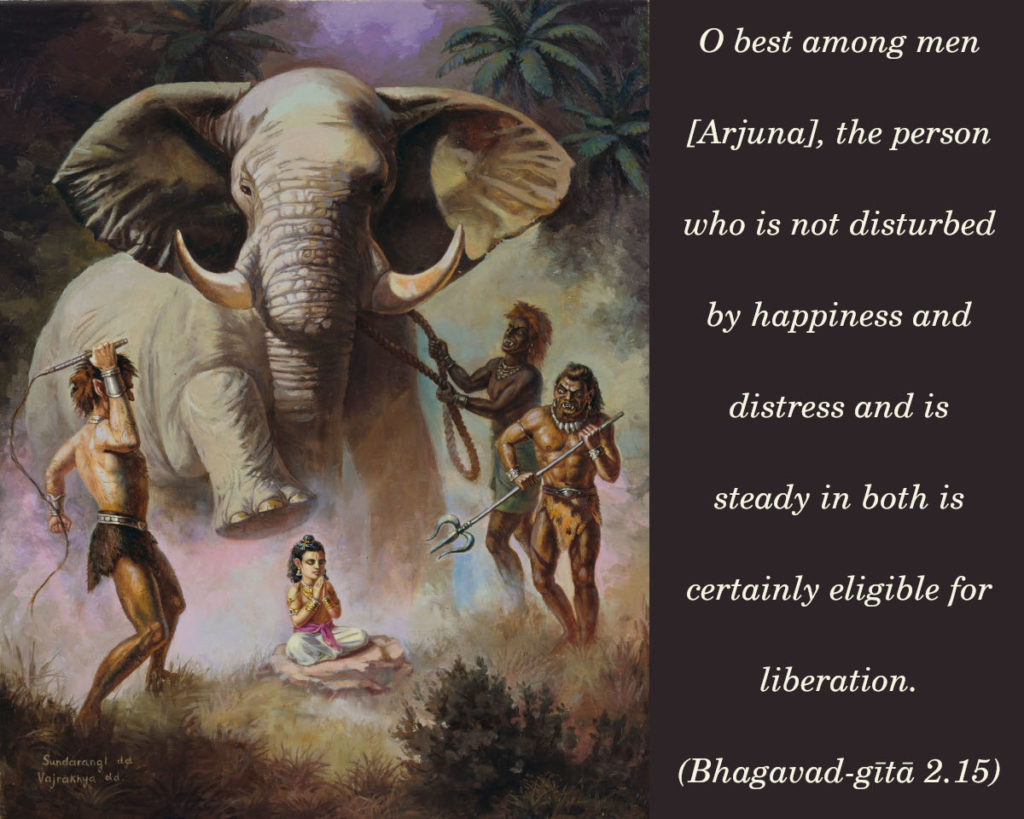यं हि न व्यथयन्त्येते पुरुषं पुरुषर्षभ |
समदु:खसुखं धीरं सोऽमृतत्वाय कल्पते || 15||
yaṁ hi na vyathayantyete puruṣhaṁ puruṣharṣhabha
sama-duḥkha-sukhaṁ dhīraṁ so ’mṛitatvāya kalpate
yam—whom; hi—verily; na—not; vyathayanti—distressed; ete—these; puruṣham—person; puruṣha-ṛiṣhabha—the noblest amongst men, Arjun; sama—equipoised; duḥkha—distress; sukham—happiness; dhīram—steady; saḥ—that person; amṛitatvāya—for liberation; kalpate—becomes eligible
Translation:
The firm man who is not affected by pain and pleasure, who remains equal-minded, surely is fit for immortality, O Arjuna, Chief of mortals!
Commentary:
Chief among mortals: He who has controlled the senses, who is not attracted by worldly objects, and who is equal-minded in pain and pleasure, is the best of men. Worldly greatness is not enough, but along with it, one should acquire spiritual excellence also. Then alone he becomes the chief among mortals. The Lord exhorts Arjuna to acquire spiritual greatness, and so he addresses him as ‘chief among mortals’ – (Purusharshabha)
Equal in pain and pleasure: Firmness of character implies equanimity of mind under all conditions of pain and pleasure. He is firmly fixed in Atma who feels that the pairs of Opposites (`dvandas’) are only modifications of the body and mind. Pleasure is only a wave of the mind, and pain is also a wave of the mind. The Atma is above the mind. It is a witness of these changes. So the firm man is indifferent to them, like Suka in the court of Janaka.
He is fit for immortality: Liberation is known as immortality. The world of name and form is dead matter, Jada. It is subject to birth and death. The state of Atma is deathless. So liberation is not something to be acquired fresh by man, but it is his essential nature. It is not something existing in the Heaven or sky. It is immortality here and now and forever. He who attains this state does not come under the power of death. He has no need to take a body again.
Fitness for Moksha is not here confined to any race, religion, or caste. The Lord simply says that the man of heroic endurance and equal-mindedness is alone fit for liberation. There is no distinction of caste or creed.
Question: What is Moksha?
Answer: The state of happiness ‘ananda’ is Moksha.
Question: Who can attain it?
Answer: He who is not drawn by sense objects, who is firm and equal-minded in pain and pleasure attains it.
Question: Who is a firm man (dhira)?
Answer: The man of equanimity in life and death, in the midst of all the tremendous agitations of life, is entitled to be called a firm man (dhira).
